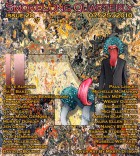Kate wrote corrections for the newspaper, apologetic little paragraphs tucked away in the bottom corner of page A2. It was delicate work: she had to fill them with the appropriate degree of remorse without giving the impression that the paper admitted culpability for any actual wrongdoing. The person pictured on page C1 of the Lifestyle section was not Charles Bukowski, but Carol Channing, who is alive and well. We are sorry for any confusion.
She had a talent for this, for deftly shirking responsibility, and over time, she had learned to write her corrections in such a way that the reader might conclude that in fact he was at fault for believing the false information originally provided. Due to incorrect information supplied to the reporter, the Bulletin mistakenly stated that fisherman Arnold McDonough was found dead of a harpoon wound in Crickham Harbor. The weapon was actually a steak knife. We regret the error.
Eventually, she found herself crafting corrections for the errors of her own life. We regret eating the whole pint of Chunky Monkey, succumbing to those post-traumatic psychological cravings, which would have been bad enough if we were not also lactose intolerant. Kate treated it like a game, these doodles in the margins of her day. How easy it was to regret so impersonally, so officially, sheathed in an editorial cloak of indifference. “We regret”: spreading the guilt and thereby eliminating it from any one person, dismissed as the fault of the abstract entity of The Newspaper, each correction a tiny exercise in irony.
Kate attempted to dispense with her own guilt in this way, by doling it out among her unknowing coworkers, journalists and editors who erred without shame, who made mistakes and then compensated for them by allowing others to acknowledge them in their absence. A sort of confession without penance, therapeutic purging without the couch and $75 hourly fees.
More detailed corrections emerged, these tinged with the true remorse of errors uncorrectable. We lament moving to the vacant apartment above the restaurant, where the stink of cooking oil seeps into the walls so that everything we eatquinoa, spinachreminds us of greasy fast food; a place worse than the first cheap slumlord room we rented in college and seeming even more so after abandoning the tranquil suburban street with a backyard and residential zoning. She wrote them desperately, compulsively.
It was also a punishment, apologizing constantly for other people’s mistakes, for even though the shame carried no real weight, the residual guilt lingered, and the relief of forgiveness lent no benefits, because Kate understood that she was not personally forgiven for a single thing for which she apologized. Like Sisyphus pushing a boulder of sorrow continually up the hill, Kate was doomed to forever apologize for crimes she did not commit, simply because she could not work up the appropriate expression of guilt for those she did commit.
Rather than find solace in repairing her newspaper’s wrongs, then, Kate wrote increasingly accusatory corrections, defiant ones. We should not have been persuaded by your religious mores. We regret bringing her to term against our better instincts. While you worked, we were trapped, suffocating under her suckling pull, sweat dripping between our bloated breasts.
A correction could seem so simple. An effortless paradigm shift and all was righted, all wounds healed. Sometimes, she could imagine it: she would kneel down, look her daughter in the eye, and plead for a forgiveness she knew she didn’t deserve, and know that, regardless, she would receive it. That was the worst part, unearned forgiveness, undeserved reconciliation. And so this kept her going at her task.
Kate even considered publishing her own correction on page A2, an apology to her husband. But it came out as chanting, a litany of remorse, We regret we regret we regret. They were merely words, hardened into meaninglessness. Some errors could never be rectified, not in ink on paper, not in a kneeling embrace.
Though a topical storm would be thematically relevant, we intended the headline to read, “Tropical storms slam coast.” It was so simple to fix others’ errors. So despite her failure, Kate continued to pen corrections, convinced that someday, she would regret nothing.



 The core workshop of SmokeLong Fitness is all in writing, so you can take part from anywhere at anytime. We are excited about creating a supportive, consistent and structured environment for flash writers to work on their craft in a community. We are thrilled and proud to say that our workshop participants have won, placed, or been listed in every major flash competition. Community works.
The core workshop of SmokeLong Fitness is all in writing, so you can take part from anywhere at anytime. We are excited about creating a supportive, consistent and structured environment for flash writers to work on their craft in a community. We are thrilled and proud to say that our workshop participants have won, placed, or been listed in every major flash competition. Community works.